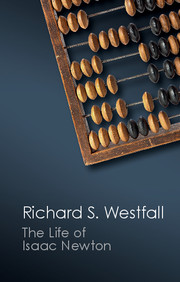Book contents
- Frontmatter
- Dedication
- Contents
- Preface
- Acknowledgments
- A Note About Dates
- Plates
- 1 A Sober, Silent, Thinking Lad
- 2 The Solitary Scholar
- 3 Anni Mirabiles
- 4 Lucasian Professor
- 5 Publication and Crisis
- 6 Rebellion
- 7 Years of Silence
- 8 Principia
- 9 Revolution
- 10 The Mint
- 11 President of the Royal Society
- 12 The Priority Dispute
- 13 Years of Decline
- Bibliographical Essay
- Index
13 - Years of Decline
Published online by Cambridge University Press: 05 October 2015
- Frontmatter
- Dedication
- Contents
- Preface
- Acknowledgments
- A Note About Dates
- Plates
- 1 A Sober, Silent, Thinking Lad
- 2 The Solitary Scholar
- 3 Anni Mirabiles
- 4 Lucasian Professor
- 5 Publication and Crisis
- 6 Rebellion
- 7 Years of Silence
- 8 Principia
- 9 Revolution
- 10 The Mint
- 11 President of the Royal Society
- 12 The Priority Dispute
- 13 Years of Decline
- Bibliographical Essay
- Index
Summary
The PRIORITY DISPUTE dragged on with diminished intensity for A another six years and during that time continued to occupy a major part of Newton's consciousness. He had never been able to lay a project down easily. Wound up as tightly as he was now, and with his honor at stake, he could not put the dispute aside simply because his antagonist had died. It was 1723 when its final faint echo was Newton's refusal to reply to a letter from Bernoulli.
Among its other effects, the controversy served to remind Newton that he needed to give attention to his intellectual legacy. As a result, he devoted considerable attention during his old age to new editions of his works. In 1717, it was a new edition of the Opticks. He did not touch the body of the treatise, which continued to set forth conclusions as he had established them forty-five years earlier, but he composed a set of eight new Queries, which he inserted as Queries 17-24 between the original set of sixteen Queries in the first edition and the set of seven added to the Latin edition. Continuing a retreat from the radical stance of earlier years, he now postulated a cosmic aether to explain gravity. To be sure, the aether had so little in common with conventional mechanical fluids that the retreat was more apparent than real, and Newton may have intended it more as a sop than a concession. The aether, he said, was “exceedingly more rare and subtile than the Air, and exceedingly more elastick and active.” He concluded indeed that the ratio of its elastic force to its density must be more than 490 billion times that of air. Was such a medium possible? It was, Newton argued, if one supposed that the aether, like the air, is composed of “Particles which endeavour to recede from one another ….” That is, Newton's new aether embodied the very problem it seemed to explain, action at a distance in the form of a mutual repulsion between aethereal particles. Standing rarer in the pores of bodies than in free space, the aether caused the phenomena of gravity by its pressure.
The Opticks was in English, of course. Only a Latin edition could effectively reach the Continental audience, and in 1719 Newton published a second Latin edition that included the new Queries.
- Type
- Chapter
- Information
- The Life of Isaac Newton , pp. 297 - 313Publisher: Cambridge University PressPrint publication year: 2015



